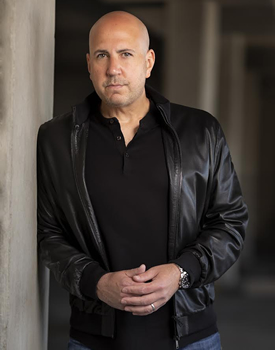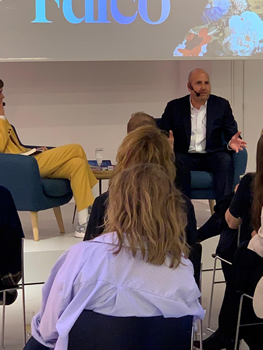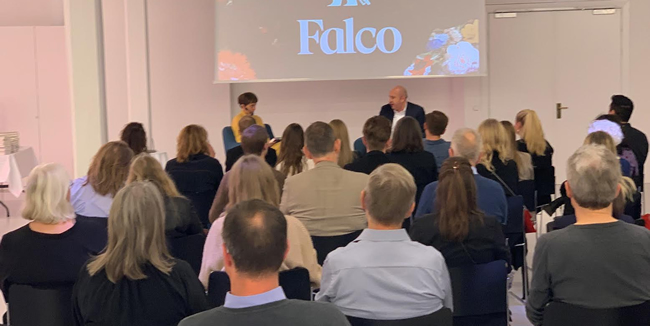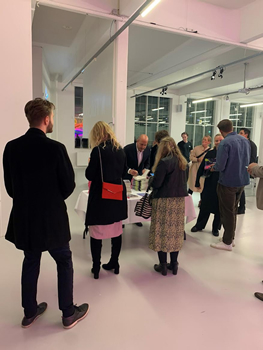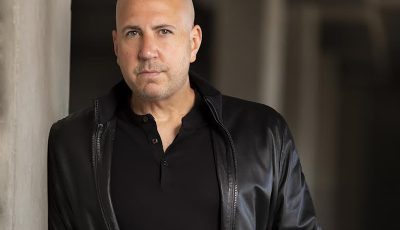

Up Close: Alex Finlay
The Ties That Bind
 By Dawn Ius
By Dawn Ius
Alex Finlay wasted no time in establishing himself as a “thriller writer to watch” with last year’s highly anticipated debut, Every Last Fear. The book came with major endorsements from genre heavyweights, and garnered well-deserved praise from critics, readers, and author peers.
For some writers, that kind of buzz can create tension—will the sophomore release live up to expectation? Rather than succumb to that pressure, Finlay embraces it with his latest release THE NIGHT SHIFT, and transfers all that potential angst onto his characters. From the book’s opening scene, the tension never lets up.
Finlay kicks things off with a nostalgic return to 1999, on the eve of Y2K, back when you had to rent movies from Blockbuster rather than click a button on the TV. But the nostalgia ends quickly when the four teenagers working the night shift that evening are attacked and only one survives—Ella.
Fast forward 15 years. Ella is now a therapist who, understandably, suffers some post-trauma effects, most notably in her personal life choices. But rather than avoid the past, she’s forced to confront it when more teenagers are attacked at an ice cream store in the same town. Again, only one survivor, Jesse, makes it out alive—and that’s not the only resemblance to the previous unsolved murder mystery.
Told through several points-of-view—including Every Last Fear’s FBI Agent Sarah Keller—THE NIGHT SHIFT takes readers on a propulsive, twisty journey. In this interview with The Big Thrill, Finlay talks more about the role of nostalgia in his novels, crafting the textbook thriller, and how his writing—and promotion—changed throughout the pandemic.
In THE NIGHT SHIFT the lives of Ella and Jesse—both survivors of separate workplace murders—intersect in what I think is a really fresh take on the increasingly popular “final girls” trope. I’d love to hear more about how those characters developed for you and how their trauma impacts their decisions.
I wanted to explore the legacy of trauma—how it manifests itself in victims and how, like grief, people deal with it in different ways. For Ella, she’s the lone survivor of an attack on the employees at her part-time job at Blockbuster Video in 1999. Fifteen years later, she’s become a therapist who wants to help people, but at the same time, she makes self-destructive and reckless decisions in her own life. Then she’s brought in to help investigators talk with 17-year-old Jesse, the lone survivor of an eerily similar crime at an ice cream store in the same town. They develop a unique bond, forged in similar tragedies. And soon both share secrets that may help catch a killer—and hopefully find them peace.
Speaking of great characters, I was happy to see the return of FBI Agent Sarah Keller, who we met in your brilliant break-out novel, Every Last Fear. While she provides connective tissue between the novels, THE NIGHT SHIFT wouldn’t be considered a sequel or her a series character. Do you envision her making an appearance in future books?
Keller was a surprise reader favorite in Every Last Fear. I wasn’t planning to bring her back, but as I wrote THE NIGHT SHIFT she just appeared. I love writing her and her husband Bob. Both are so decent and supportive of one another, and they provide some needed moments of calm in the storm. In THE NIGHT SHIFT, we meet Keller years before the events in Every Last Fear when she’s a newer agent and eight months pregnant, and I hope readers again connect with her at this different stage of her life. I have no current plans to bring Keller back, but never say never.
This is a pretty classic thriller—whip-smart pacing, cliffhanger chapter endings, constant ratcheting up of the suspense. As you know, The Big Thrill is as much for aspiring writers as it is for readers. What tips would you offer for crafting the classic thriller?
Thank you! As for advice, it’s cliché, but I’ll say it: Write the book you want to read. And critically, to do that, you need to read a lot, in the genre and out. I’ve never met a successful novelist who wasn’t also an avid reader.
Along the same lines, I love how you used the era—1999, on the eve of Y2K and all of the unknown surrounding that—to create even more tension. For the characters, it’s an ominous time. What do you remember feeling in 1999 with respect to Y2K?
I remember sitting at a bar on New Year’s Eve on Y2K waiting for chaos to ensue—there was an electricity in the air. For the book’s opening scene, I thought it would be interesting to juxtapose that feeling with the levity of teenage co-workers on an otherwise typical Friday night. The aim was to simultaneously create a sense of normal and sense of dread.
You’ve woven in a number of twists, and I feel like I should know the answer to this, but, plotter or pantser? Some kind of hybrid?
I’m not a plotter or pantser. I’m a think-about-the-scenes-in-my-head-for-days-then-write-them-down-quickly-while-on-long-walks-er. That’s an obnoxious answer, I know, but it captures my (current) process. I used to write after midnight, mostly because I had younger children. Later, it was on the subway to and from my law office in downtown DC. During the pandemic, it moved to long walks, tapping out the first draft of scenes on my phone. My view is that all writers have to find what works for them. I just hope my process doesn’t end with me getting run over on Connecticut Avenue.
You mentioned changing how you write during the pandemic. Have you had to change how you promote your work? Have you had any in-person events?
I think all writers have had to pivot. Booksellers have been terrific and mastered virtual events, and I’ve had to rely more on social media. I’m hopeful the world is returning to normal and I’ll have some in-person events for THE NIGHT SHIFT. During that brief window in the Fall when we thought we’d turned the corner on COVID, I was invited to Denmark by my Danish publisher, and had an exciting in-person tour throughout the country. My publishing team there was amazing, and the trip was even more special since I hadn’t been able to travel for so long. I know we’re all eager for things to return to normal, and I’m cautiously optimistic.
One of the things you do so well in your books is create a sense of nostalgia—in THE NIGHT SHIFT, you had me longing for those times when we couldn’t just pick a movie by scrolling through a thousand streaming services, we had to walk into a Blockbuster store and rent something. Do you have a memorable Blockbuster experience?
Yes, I was in college and dirt poor and lost the movie Tango & Cash and they wanted $80 I didn’t have to replace it. Ultimately, the manager, a guy not unlike my character Stevie, took pity on me and threw up his hands and said, You don’t have to pay, but you can’t rent here anymore.
Speaking of movies/TV, I know Every Last Fear was optioned. While COVID has slowed down many things, is there anything you can share about what’s happening with that—and also, whether there’s been interest in THE NIGHT SHIFT in terms of film or TV?
Every Last Fear is currently in development for a major limited series with a high-profile director attached. That deal also encompasses the Agent Keller character and thus THE NIGHT SHIFT. I can’t say much more until they officially announce it all, but don’t worry, I’ll of course be humble-bragging on social media when it’s announced.
I love looking for the pop culture references in your work, and I know that music inspires you. What factors go into determining the references you’ll use? Also, I know you’re a Def Leppard fan—are you also a Nirvana fan? It’s possible to be both, right?
I played in bands in the late 1980s and early 1990s, a turning point from hair bands to the Seattle scene, so I love it all, something I think we all do with the songs of our youth. I’ve been watching Peacemaker and loving the throwback ’80s rock. I think the types of movies/TV and music we like can reveal a lot about us, so it’s a helpful tool to convey things about my characters.
What can you tell us about your current work in progress?
That it doesn’t have a title and I’m behind schedule. Like I was for THE NIGHT SHIFT. And Every Last Fear. And pretty much everything else. But I’ll somehow manage to get it done (he tells himself…)
Thank you for the insightful questions from one of my favorite publications!
- On the Cover: Alisa Lynn Valdés - March 31, 2023
- On the Cover: Melissa Cassera - March 31, 2023
- Behind the Scenes: From Book to Netflix - March 31, 2023

